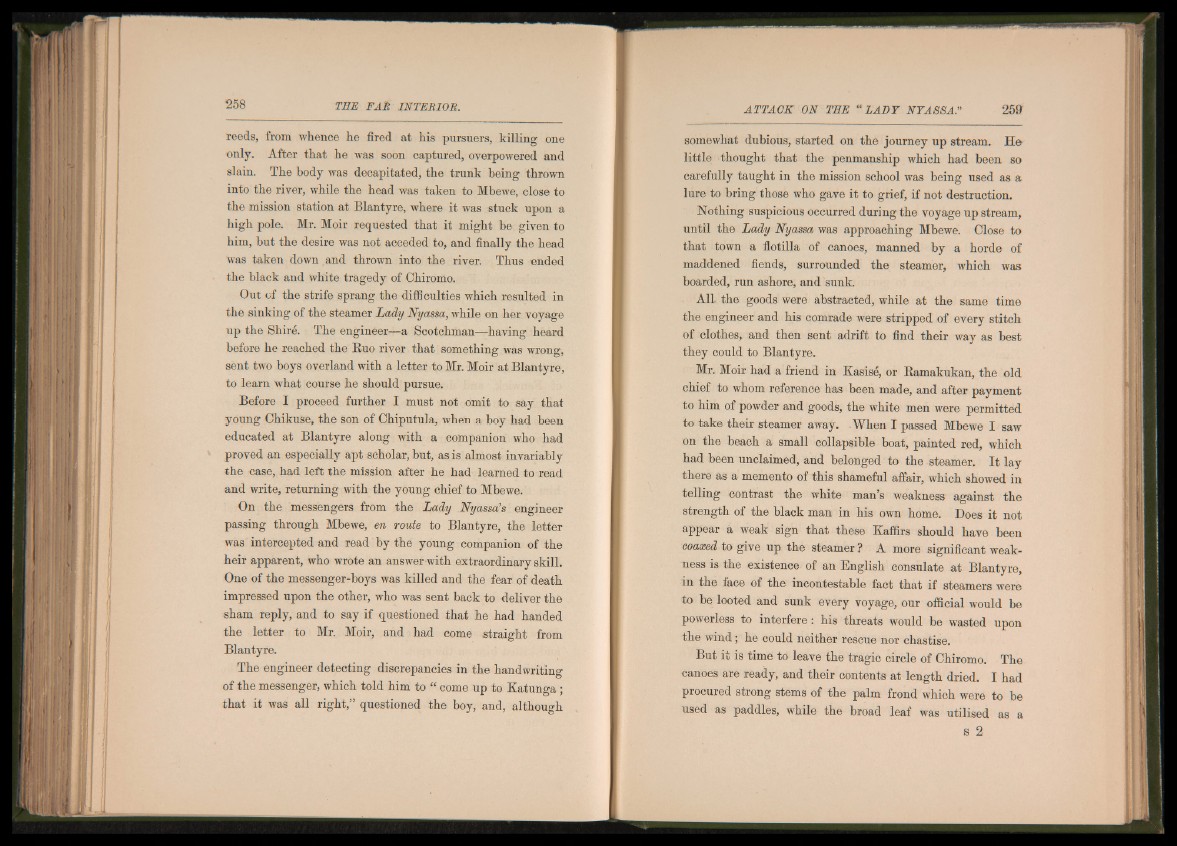
reeds, from whence he fired at his pursuers, killing one
only. After that he was soon captured, overpowered and
slain. The body was decapitated, the trunk being thrown
into the river, while the head was taken to Mbewe, close to
the mission station at Blantyre, where it was stuck upon a
high pole. Mr. Moir requested that it might he given to
him, hut the desire was not acceded to, and finally the head
was taken down and thrown into the river. Thus ended
the black and white tragedy of Chiromo.
Out of the strife sprang the difficulties which resulted in
the sinking of the steamer Lady Nyassa, while on her voyage
up the Shire. The engineer—a Scotchman—having heard
before he reached the Euo river that something was wrong,
sent two boys overland with a letter to Mr. Moir at Blantyre,
to learn what course he should pursue.
Before I proceed further I must not omit to say that
young Ohikuse, the son of Chiputula, when a boy had been
educated at Blantyre along with a companion who had
proved an especially apt scholar, but, as is almost invariably
the case, had left the mission after he had learned to read
and write, returning with the young chief to Mbewe.
On the messengers from the Lady Nyassa’s engineer
passing through Mbewe, en route to Blantyre, the letter
was intercepted and read by the young companion of the
heir apparent, who wrote an answer with extraordinary skill.
One of the messenger-boys was killed and the fear of death
impressed upon the other, who was sent back to deliver the
sham reply, and to say if questioned that he had handed
the letter to Mr. Moir, and had come straight from
Blantyre.
The engineer detecting discrepancies in the handwriting
of the messenger, which told him to “ come up to Katunga ;
that it was all right,” questioned the boy, and, although
somewhat dubious, started on the journey up stream. BA
little thought that the penmanship which had been so
carefully taught in the mission school was being used as a
lure to bring those who gave it to grief, if not destruction.
Nothing suspicious occurred during the voyage up stream,
until the Lady Nyassa was approaching Mbewe. Close to
that town a flotilla of canoes, manned by a horde of
maddened fiends, surrounded the steamer, which was
boarded, run ashore, and sunk.
AIL the goods were abstracted, while at the same time
the engineer and his comrade were stripped of every stitch
of clothes, and then sent adrift to find their way as best
they could to Blantyre.
Mr. Moir had a friend in Kasise, or Bamakukan, the old
chief to whom reference has been made, and after payment
to him of powder and goods, the white men were permitted
to take their steamer away. When I passed Mbewe I saw
on the beach a small collapsible boat, painted red, which
had been unclaimed, and belonged to the steamer. I t lay
there as a memento of this shameful affair, which showed in
telling contrast the white man’s weakness against the
strength of the black man in his own home. Does it not
appear a weak sign that these Kaffirs should have been
coaxed to give up the steamer ? A more significant weakness
is the existence of an English consulate at Blantyre,
in the face of the incontestable fact that if steamers were
to be looted and sunk every voyage, our official would be
powerless to interfere: his threats would be wasted upon
the wind; he could neither rescue nor chastise.
But it is time to leave the tragic circle of Chiromo. The
canoes are ready, and their contents at length dried. I had
procured strong stems of the palm frond which were to be
used as paddles, while the broad leaf was utilised as a
s 2